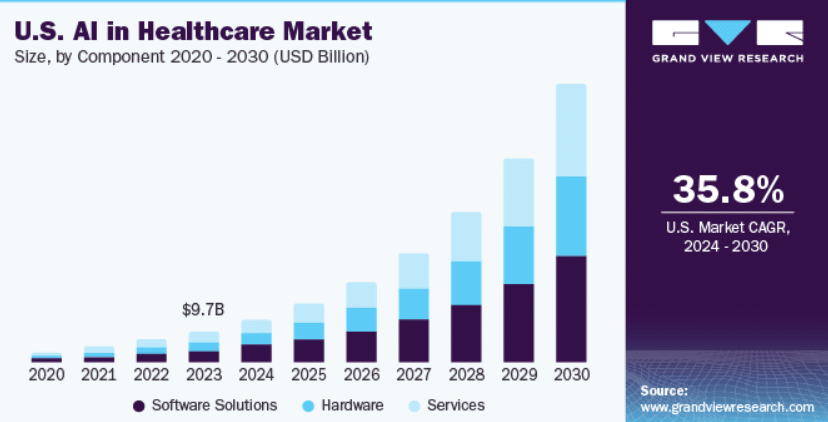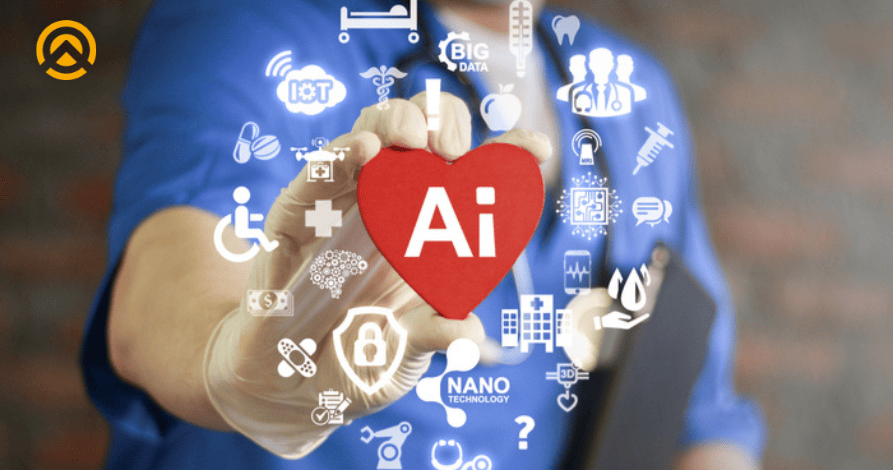The Role of AI in Healthcare: Shaping the Future of Medical Services
Have we ever thought of making intelligent medicines, but the current era is full of innovative advancements. The emergence of technology-aided solutions works towards completely reforming the healthcare sector. Technologies like Artificial Intelligence hold the potential to transform the existing healthcare sector and its processes. The development of such solutions works to improve the quality of healthcare procedures and assures successful medical outcomes. Innovative advancements in the healthcare sector have occurred throughout history, leading to the ability advancements treat complex diseases.
The development of healthcare solutions based on algorithms and machine learning can lead to accurate outcomes for detecting severe diseases and microbots for body inspection. World Economic Forum, for breast cancer AI-enabled mammogram gets reviewed approximately 30 times faster with 100% accuracy indicating the reduced use of biopsies. Along with this, the micro AI bots show the capability of inside-body inspection. The research data by Grand View Research highlights the same aspects.

As per the above figure the global AI in healthcare sector was recorded at a value of USD 15.4 billion in 2022. Which is expected to reach comparatively more high values with a compound annual growth rate of 37.5% within the timeframe of 2023 to 2030. This indicates that the emergence of AI holds huge potential to reform the healthcare sector. Also, this research highlights the major areas of market growth such as datasets of patient health-related digital information, the demanding nature of reducing care expenses, and personalization of the medicine system.
Blog Highlights
AI is everywhere and now the healthcare sector is also getting advanced in involving this technology and becoming digitally smart. This blog is all about the contributing factors that can help in perfectly establishing AI in healthcare. Are you seeking guidance for adapting these AI-aided techs in your healthcare business. Let’s give this a quick read.
Benefits of AI in Healthcare
The role of artificial intelligence in healthcare has major significance and works as an effective asset for healthcare organizations. AI applications in healthcare work to improve the efficiency of all the healthcare processes for handling back office to patient care. This integration can result in many benefits which are mentioned further.
1. Overall Efficiency Increment of Healthcare Operations
Healthcare is a vast field that requires the contribution of different assets and sometimes traditional sources get less productive while facing certain conditions. The development of AI mobile applications in healthcare can work to improve the overall efficiency of medical processes. These solutions make sure that healthcare workers spend less time managing administrative tasks and directly reduce the paperwork. Along with this when it comes to patient care and assistance AI-based virtual assistants are subjected to be very user-friendly. In other words, people are accepting these solutions and getting a set of required information that they seek from healthcare professional nurses. Along with this AI-aided solutions work on resolving issues like patient medical reductions, too much blood loss in invasive surgeries, and the matters of healthcare frauds.
2. Enhanced Healthcare User Experience
In a recent study, patients identified inadequate communication as the most challenging aspect of their healthcare experiences, highlighting a pressing demand for improved dialogue between patients and healthcare providers. AI technologies, including natural language processing (NLP), predictive analytics, and speech recognition, present opportunities for healthcare providers to enhance communication effectiveness. For instance, AI has the potential to provide precise information on a patient’s treatment options, enabling healthcare professionals to engage in more meaningful conversations with patients and facilitate shared decision-making.
3. Betterment in Healthcare Monitoring and prevention
With the increasing popularity of health and fitness monitors and the widespread use of health-tracking apps, individuals can now share real-time data sets with their doctors to monitor health and receive alerts in case of issues. AI solutions, encompassing big data applications, machine learning algorithms, and deep learning algorithms, offer the potential to assist humans in analyzing vast datasets for clinical decision-making and beyond. Additionally, AI can play a role in detecting and tracking infectious diseases like COVID-19, tuberculosis, and malaria.
4. AI-Enabled Governance
As AI’s role in healthcare grows, ethical and regulatory frameworks are becoming crucial. Concerns like bias, transparency, privacy, and safety must be addressed. A report by Gartner, emphasizes the necessity of AI governance, particularly for clinical applications. However, the lack of common rules poses challenges for innovators. The World Health Organization (WHO) collaboratively crafted a report on the Ethics and governance of AI for Health, addressing ethical challenges, risks, and proposing six principles for AI’s public benefit. These include safeguarding autonomy, ensuring transparency, and promoting equity. The report also offers recommendations to maximize AI’s potential while ensuring accountability and responsiveness in healthcare.
5. Establishes Connection Between Disparate Healthcare Data
AI is revolutionizing health systems by streamlining information gathering and sharing, particularly in the realm of patient data tracking for providers. An illustrative case is evident in diabetes management, where wearable devices relay real-time glucose feedback to both patients and their medical teams. AI plays a pivotal role in efficiently collecting, storing, and analyzing this wealth of information, providing data-driven insights that empower healthcare professionals to refine treatment strategies and disease management approaches.
Read more: How to Develop a Health Insurance Application? Cost, Key Features & Process
Types of AI Additions in Healthcare

Artificial intelligence is considered the trendiest technical umbrella term of advanced technology. That is expanding its span at a rapid rate and providing advancements accordingly. When it comes to the future of AI in healthcare, there are a variety of applications that are continuously expanding from a bright future perspective. Some of these AI additions are discussed further.
1. Machine Learning for Neural Networks and Deep Learning
Machine learning, a prevalent form of AI, involves fitting models to data and learning through training with data. In healthcare, traditional machine learning finds application in precision medicine, predicting treatment success based on patient attributes. Neural networks, a more complex form, have been established in healthcare research for decades, and utilized in categorization applications such as disease prediction. The most intricate machine learning forms, like deep learning, involve neural networks with numerous levels of predicting outcomes. Deep learning is increasingly applied in radiomics for detecting clinically relevant features, particularly in oncology-oriented image analysis, promising enhanced diagnostic accuracy.
2. Natural Language Processing
Understanding human language has been an AI goal since the 1950s, forming the field of Natural Language Processing (NLP). NLP applications, such as speech recognition, text analysis, and translation, pursue language-related objectives. Two fundamental approaches exist statistical and semantic NLP. Statistical NLP, leveraging machine learning like deep learning neural networks, has notably enhanced recognition accuracy, requiring extensive language data for learning. In healthcare, NLP finds dominance in creating, comprehending, and classifying clinical documentation and research. NLP systems analyze unstructured patient notes, generate reports, transcribe interactions, and facilitate conversational AI.
3. Robotic Process Automation
Robotic Process Automation (RPA) performs digital tasks for administrative purposes, mimicking human actions on information systems. Unlike other AI forms, RPA is cost-effective, easy to program, and transparent. Despite the term “robotic,” it involves computer programs on servers, utilizing workflows, business rules, and integration with information systems to function like a semi-intelligent user. In healthcare, RPA is applied to repetitive tasks such as prior authorization, patient record updates, and billing. When coupled with technologies like image recognition, RPA can extract data from faxed images for input into transactional systems. These technologies are increasingly integrated, paving the way for composite solutions in the future.
4. Rule-Based Expert System
Expert systems, dominant in AI during the 1980s, operated on collections of ‘if-then’ rules and found widespread commercial use. In healthcare, they played a significant role in clinical decision support for decades and remain in use today, with much electronic health records (EHR) providers incorporating rule sets into their systems. Constructed by human experts and knowledge engineers, these systems excel when the rule set is manageable, providing ease of understanding. However, challenges arise when dealing with a large number of rules, leading to potential conflicts and breakdowns. Adapting to changes in the knowledge domain can also prove cumbersome. In healthcare, they are gradually being supplanted by approaches grounded in data and machine learning algorithms.
5. Physical Robots
Physical robots, are installed annually globally and are recognized for their roles in tasks like lifting, welding, and assembling in industrial settings, as well as delivering supplies in hospitals. Recent advancements make robots more collaborative and trainable, allowing them to work alongside humans more effectively. As AI capabilities are integrated into their operating systems, robots are evolving to become more intelligent. Surgical robots, introduced in many countries empower surgeons with enhanced precision and minimally invasive capabilities in procedures like gynecologic, prostate, and head and neck surgery. While they augment surgical capabilities, critical decisions remain within the purview of human surgeons.
6. Diagnosis and Treatment Application
The pursuit of AI in disease diagnosis and treatment started in an early stage with the easy process of healthcare application development. That initially targeted blood-borne bacterial infections. Early rule-based systems and other mobile application development practices. This showed progress but healthcare mobile app developers faced challenges in integration with clinical workflows and medical record systems. IBM’s Watson gained attention for precision medicine, but initial enthusiasm waned due to difficulties in adapting to specific cancer types and integrating them into care processes. While implementation issues persist, research labs and tech firms are advancing AI-based approaches for disease diagnosis and treatment, particularly in radiological image analysis. Challenges remain in integrating AI recommendations into clinical workflows and electronic health record systems, hindering widespread adoption.
7. Administrative Applications
AI applications in healthcare administration, are equally revolutionary as patient care and offer significant efficiency gains. Notably, Robotic Process Automation (RPA) proves valuable, particularly in tasks like claims processing, clinical documentation, revenue cycle management, and medical records management. With the average medical professional spending less work time on administrative activities, these technologies address crucial needs. Chatbots have been experimented with for patient interaction, mental health, and telehealth, offering convenience for tasks like prescription refills. However, user concerns about confidentiality and usability highlight challenges. Machine learning aids claims and payment administration through probabilistic data matching, helping insurers verify millions of claims accurately, ultimately saving time, money, and effort for all stakeholders.
Related Blog: LLMs in Healthcare: Empowering Healthcare IT System
Conclusive Outlines
The integration of AI-driven solutions takes center stage as a pivotal stride in reshaping healthcare processes. Ensuring robust protection for sensitive healthcare data becomes paramount as these AI solutions become integral to operations. Tailored to the unique needs of the healthcare sector, these solutions offer a diverse set of comprehensive tools. The growing demand for secure and intelligent automation has propelled visionary developers and healthcare entities to prioritize the security and innovation of their processes. Despite initial challenges, many have successfully positioned themselves as trailblazers in AI-driven healthcare transformation. In today’s dynamic healthcare landscape, the adoption of intelligent AI solutions has become increasingly accessible.
Amplework emerges as a leader in the healthcare technology sphere, boasting over 5+ years of immersive experience. We excel in developing and recognizing the critical importance of AI innovation in revolutionizing healthcare practices. Our dedicated team consistently surpasses client expectations, establishing a reputation for reliability and trustworthiness. Having achieved significant milestones in supporting various healthcare entities, we adhere to the highest standards of security and innovation. Explore our website to unveil the exceptional AI-driven healthcare mobile app development services we offer. Partner with Amplework to embark on a transformative journey in the fusion of technology and care in healthcare.



 sales@amplework.com
sales@amplework.com
 (+91) 9636-962-228
(+91) 9636-962-228





